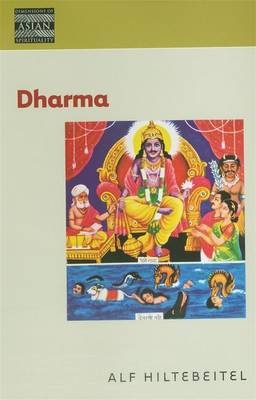
Dharma
Seiten
2010
University of Hawai'i Press (Verlag)
978-0-8248-3466-1 (ISBN)
University of Hawai'i Press (Verlag)
978-0-8248-3466-1 (ISBN)
This introductory work proposes a fresh take on the ancient Indian concept dharma. By unfolding how, even in its developments as law and custom, dharma participates in nuanced and multifarious understandings of the term that play out in India's great spiritual traditions, the book offers insights into the innovative character of both Hindu and Buddhist usages of the concept. Alf Hiltebeitel, in an original approach to early Buddhist usages, explores how the Buddhist canon brought out different meanings of dharma. This is followed by an exposition of the hypothesis that most, if not all, of the Hindu law books flowered after the third-century BC emperor Asoka, a Buddhist, made dharma the guiding principle of an entire realm and culture. A discussion built around the author's expertise on the Sanskrit epics shows how their narratives amplified the new Brahmanical norms and brought out the ethical dilemmas and spiritual teachings that arose from inquiry into dharma.
A chapter on the tale of the Life of the Buddha considers the relation between dharma, moksa/nirvana (salvation), and bhakti (devotion). Here, Hiltebeitel ties together a thread that runs through the entire story, which is the Buddha's tendency to present dharma as a kind of civil discourse. In this sense, dharma challenges people to think critically or at least more creatively about their ethical principles and the foundations of their own spiritual values. A closing chapter on dharma in the twenty-first century explores its new cachet in an era of globalization, its diasporic implications, its openings into American popular culture, some implications for women, and the questions it is still raising for modern India.
A chapter on the tale of the Life of the Buddha considers the relation between dharma, moksa/nirvana (salvation), and bhakti (devotion). Here, Hiltebeitel ties together a thread that runs through the entire story, which is the Buddha's tendency to present dharma as a kind of civil discourse. In this sense, dharma challenges people to think critically or at least more creatively about their ethical principles and the foundations of their own spiritual values. A closing chapter on dharma in the twenty-first century explores its new cachet in an era of globalization, its diasporic implications, its openings into American popular culture, some implications for women, and the questions it is still raising for modern India.
| Erscheint lt. Verlag | 30.6.2010 |
|---|---|
| Zusatzinfo | Illustrations |
| Verlagsort | Honolulu, HI |
| Sprache | englisch |
| Gewicht | 391 g |
| Themenwelt | Geisteswissenschaften ► Religion / Theologie ► Buddhismus |
| Geisteswissenschaften ► Religion / Theologie ► Hinduismus | |
| ISBN-10 | 0-8248-3466-6 / 0824834666 |
| ISBN-13 | 978-0-8248-3466-1 / 9780824834661 |
| Zustand | Neuware |
| Informationen gemäß Produktsicherheitsverordnung (GPSR) | |
| Haben Sie eine Frage zum Produkt? |
Mehr entdecken
aus dem Bereich
aus dem Bereich
Unterweisungen in Zen-Meditation
Buch | Hardcover (2024)
Arkana (Verlag)
20,00 €


